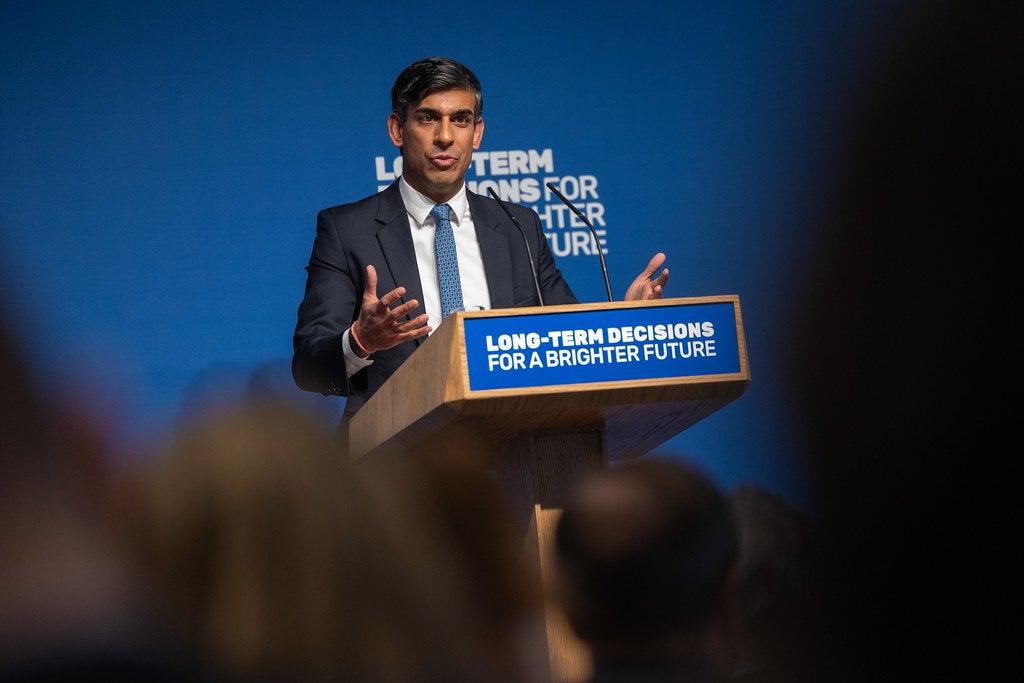
UK Prime Minister Rishi Sunak has vowed to tackle fears surrounding artificial intelligence ahead of the world’s first AI safety summit next week.
The national speech from Sunak on Thursday (26 October), follows the publishing of a landmark AI paper from the UK government on the capabilities and risks the emerging tech holds.
“AI will bring new knowledge, new opportunities for economic growth, new advances in human capability, and the chance to solve problems we once thought beyond us. But it also brings new dangers and new fears,” Sunak said.
“The responsible thing for me to do is to address those fears head-on,” Sunak added, “giving you the peace of mind that we will keep you safe while making sure you and your children have all the opportunities for a better future that AI can bring.”
Sunak said he “genuinely believes that technology like artificial intelligence will bring a transformation as far-reaching as the industrial revolution, the coming of electricity or the birth of the internet”.
The speech followed a report that claimed AI had the ability to help plan biological or chemical attacks by terrorists.
Generative AI could be “used to assemble knowledge on physical attacks by non-state violent actors, including for chemical, biological and radiological weapons,” the report stated.
It could also make it harder to trust online content and increase the risk of cyber-attacks by 2025.
The report, which is based mainly on generative AI, was made in part with declassified information from intelligence agencies.
During his speech, the PM announced that the UK would be establishing “the world’s first AI safety institute”.
“It will advance the world’s knowledge of AI safety and it will carefully examine, evaluate and test new types of AI so that we understand what each new model is capable of, exploring all the risks,” he said.
Laura Petrone, analyst at research company GlobalData, said the UK was “adopting a cautious approach” in terms of AI regulation.
“The EU and China have been the most active in envisaging regulatory frameworks and will likely set the standard for AI regulation over the next few years. The UK is not putting in place any statutory regulations for fear of stifling innovation,” she said.
Petrone added: “Nonetheless, the UK must be part of the conversation around the standards and best practices on AI and AI safety, and next week’s summit would be a great chance to achieve just that.”
Jaeger Glucina, MD and chief of staff at legal AI copilot Luminance, said while risk and safety are important when talking about AI, fixation on these elements may mean the country risks missing out on the technology’s opportunities.
“Only time will tell whether the Summit will simply provide an impressive photo opportunity for global lawmakers or a genuinely productive forum for regulatory discussion,” Glucina said.
“Regardless, moving forward there must be a clear focus on how the UK can advance AI and ensure it represents an attractive place for AI businesses to start up, grow and float,” she added.
UK AI Safety Summit
The world’s first AI safety summit, hosted in the UK, will see global leaders in government and technology discuss the potential threats AI poses for elections and national security.
The landmark two-day event, beginning on 1 November, follows concern from the UK government claiming AI “could threaten global stability and undermine our values.”
Business leaders, industry experts and politicians are expected to discuss everything from AI’s impact on online safety to its role in equality.
The myriad risks posed by AI require “an urgent international conversation given the rapid pace at which the technology is developing”, according to the UK government.
The UK’s Secretary of State for Science, Innovation and Technology, Michelle Donelan, said: “We are setting out a focused plan for the AI Safety Summit to face up to the risks of frontier AI, so together with our partners around the world we can reap the enormous benefits this transformative technology has to offer.
“AI presents an immense opportunity to drive economic growth and transformative breakthroughs in medicine, clean energy, and education.”
The summit will be held at Bletchley Park, with Matt Clifford and Jonathan Black having been recently appointed to lead the talks.
Bletchley Park was central to the team of computer scientists who broke the enigma code back in World War II. Alan Turing was among the team and the work that was done to break the enigma code remained secret until the mid-1970s.



